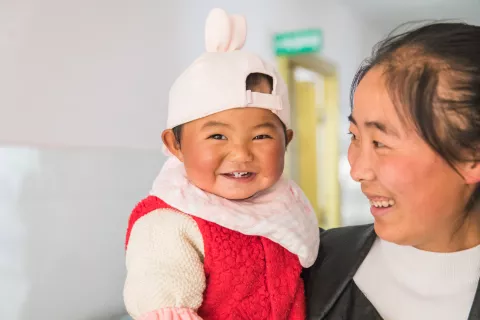How to be a great dad
Three tips from UNICEF to fathers out there

- Available in:
- 中文
- English
Men, like women, have an enormous impact on the health and development of children. The role of a father is important for a child’s development, from the start. Research shows that spending more time with your child can help them score higher on intelligence tests,[1] and help lower the rate or risk of depression, fear and self-doubt, which can be linked to improved outcomes for the children later in life with career and economic success.
Below are three ways to be a better father.
Take on an equal share of the work.
Men may not be able to breastfeed their babies, but they should be able to take on every other parenting task as well as women. There is nothing inherently different between men and women in terms of their ability to provide a child with nutrition, stimulation, and protection or as we say, eat, play, love. In fact, a study that looked at descriptions of fathering across different cultures concluded that fathers can be just as nurturing and affectionate as mothers and just as capable of providing care.[2] We should stop thinking of the role of fathers as simply “helping” mothers. Fathers play a central and equal role as parents and we do a great disservice to men when we believe otherwise.
Give special attention to a child’s early years.
In typical situations, the younger the child, the less involved the father is in the child’s care. And only when the child gets older, does the father’s role increase. But a child’s early years, which take place from the ages of 0-3, is the most crucial in their life because it is when the brain is developing most rapidly. And the kind of care that a child receives during this time has the potential to greatly affect his or her future. So while it may be easier perhaps for men to take on a greater role in the later years when a child is older, involved parenting should start from the very beginning.
Make it an objective to learn.
Research shows that men usually rely on women for knowledge on parenting. This shouldn’t be the case. As a father, you have the responsibility to find out how you can nurture, engage, and support your child at every stage of his or her life. UNICEF has tried to make it a little easier for parents by providing them with a place they can go to for expert and unbiased advice on raising children. Every single article on this Parenting Site is written for the benefit of both male and female caregivers and we encourage everyone to visit the site and make use of the resources.
[1] Engle, P. L. and C. Breaux. 1994. Is there a Father Instinct? Fathers' Responsibility for Children. Paper prepared as part of the project, "Family Structure, Female Headship and Maintenance of Families and Poverty." Population Council and the International Center for Research on Women.
[2] Engle, P. L. and C. Breaux. 1994. Is there a Father Instinct? Fathers' Responsibility for Children. Paper prepared as part of the project, "Family Structure, Female Headship and Maintenance of Families and Poverty." Population Council and the International Center for Research on Women.




